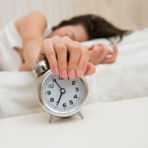Time change: the clock is being turned!
24. Okt 2025

On October 26, the clock will change from summer time to winter time. Today we tell you where the time change comes from and what consequences it has for us humans.
How does the time change work?
Every year in October, from Saturday to Sunday, the clock is set back from 3:00 to 2:00. So, in theory, we can sleep an hour longer.
In contrast, the changeover to summer time in spring robs us of an hour. On Sunday night, the clock is set forward from 2:00 to 3:00
How do you remember when an hour is set forward and when an hour is set back? ⏳
You can try to jog your memory with mnemonics. Here are two examples
In spring, the garden furniture is placed in front of the house in the garden, just as the clock is set forward. In winter, you put the garden furniture back in the house and set the clock back in the same way.
In spring the temperature goes up (one hour forward), in winter it goes down (one hour back).
Why is there this change in time? 🏔️
During the wars from 1916 to 1919 and from 1940 to 1949, daylight saving time was introduced in the German Reich in order to make better use of daylight in agriculture and the arms industry. The changeover was then abolished. When the oil crisis hit, both German states reintroduced daylight saving time in order to make better use of daylight and thus save energy. The time changeover, as it still exists today, was introduced in the summer of 1980. By 1996, the different summer time regulations in the European Union had been standardized.
Advantages ✔️
More daylight can be used
The effective use of daylight strengthens the feeling of being active
Disadvantages ❌
The changeover has an influence on our internal clock
Hardly any energy is saved
Wasn't it already decided to abolish the time change? 🤔
Yes, because surveys have shown for years that the time change is very unpopular in many European countries. In 2019, the EU Parliament approved the proposal to abolish the time change in 2021. One of the reasons why the changeover is taking so long is that all 27 EU countries have yet to agree. In addition, there is still no uniform position on whether summer or winter time should apply in future. When the coronavirus crisis and other events came to light, the issue was postponed for the time being.
Until the issue is back on the table, we will have to come to terms with the time change.
What are the health consequences for humans?
Critics argue that the twice-yearly changeover upsets the biorhythm of humans and farm animals, comparable to a mini-jetlag. This leads to health problems for many people, including sleep disorders and difficulty concentrating. In fact, it can take up to four weeks for the body to get used to the new times again.
Here are a few tips...
...for better sleep:
When switching from summer to winter time, it is advisable to go to bed later the days before and sleep a little longer the next day. 🌙
To fall asleep better, avoid fatty foods and caffeinated drinks in the evening. Instead, drink hot milk or valerian tea, for example. 🥛
A bath with essential oils such as lavender has a calming effect on the body. ✨
...for waking up in the morning:
To get your circulation going, it helps to exercise in the fresh air in the morning. 🏃♀️
Letting the sun into your bedroom in the morning also helps you wake up. ☀️
For the very brave, there is the option of alternating morning showers with hot and cold water. hot water. This stimulates blood circulation. 🚿
...for in between:
If you are tired, you should drink a lot because otherwise you will suffer from concentration problems and lack of motivation due to dehydration. 💧
You can snack yourself awake with bananas and nuts . Bananas are a real source of energy. The riper a banana is, the more sugar it contains and sugar provides the human body with quick energy.
Nuts are a real superfood with a variety of nutrients and keep you full for a long time.
Chewing gum increases the heart rate and therefore blood flow to the brain.
Tiredness can also be alleviated with a midday nap can also be driven away. 💤
We hope these suggestions will help you to master the transition period in a relaxed way! 🕰️✨
0Noch keine Kommentare
Die mit einem Sternchen (*) gekennzeichneten Felder sind Pflichtfelder. Bitte fülle diese aus, um deine Kommentare erfolgreich abgeben zu können.
-
On-site education: Excursion to the Hochstadt district clinic
In mid-November, we, the second-year apprentices, visited the district hospital in Hochstadt together with our colleagues Bernd Woelkert (addiction officer on the employee side) and Jana Freitag (representative for people with (severe) disabilities). -
Two top places - success in training and studies!
On 02.12.2025, there were two special occasions that show how strongly talent development is practiced at BAUR. -
How shopping at BAUR became barrier-free - Behind the Scenes
This article reports on the specific measures implemented in our BAUR online store and the findings of tests with those affected. Here is part 2 on accessibility in e-commerce.





